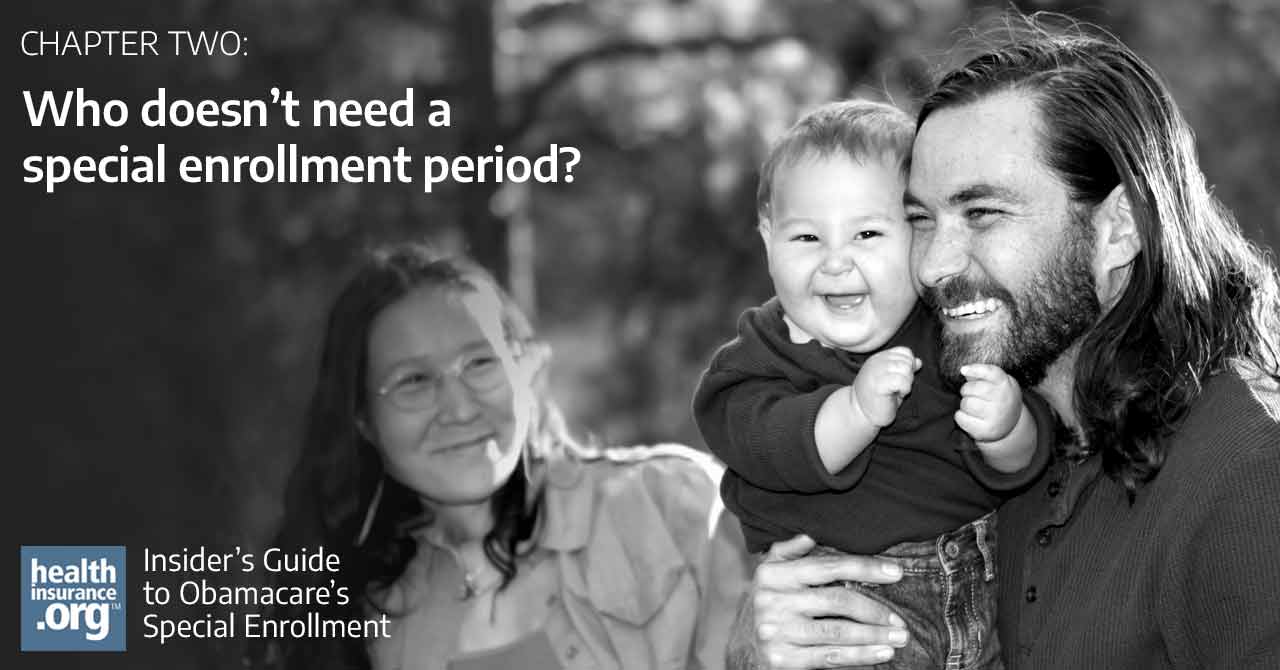
If you need to obtain your own health insurance (ie, not through your employer), you’re probably familiar by now with the fact that the individual health insurance market has an annual open enrollment period. To enroll outside of open enrollment, most applicants will need a qualifying event in order to trigger a special enrollment period (SEP).
But qualifying events and SEPs aren’t always necessary. Enrollment continues year-round in some cases, and you don’t need a qualifying event if you’re in one of these categories:
- Native Americans and Alaska Natives. The Affordable Care Act has a provision that allows Native Americans and Alaska Natives to enroll year-round in the exchanges. They also have access to plans with zero cost-sharing if their income is under 300% of the federal poverty level. In the final Benefit and Payment Parameters for 2018, HHS added a provision to ensure that dependents of American Indians can enroll on the same application with the American Indian.
- Anyone eligible for Medicaid or Children’s Health Insurance Program (CHIP). Enrollment in these plans is available year-round, both for people who are newly eligible due to a change in income, and for people who were already eligible but not yet enrolled.
- In nearly every state, low-income people who are eligible for premium subsidies (ie, they aren't eligible for Medicaid or in the coverage gap) and whose income doesn't exceed 150% of the poverty level can enroll at any time, until at least the end of 2025 (in some states, the income limit is higher).
- Residents of New York who are eligible for The Essential Plan. This is a Basic Health Program (BHP) that was implemented in New York in 2016. It’s available for residents who are not eligible for Medicaid or CHIP, and whose annual household income is up to 200% of the federal poverty level (FPL).
- Residents of Minnesota who are eligible for MinnesotaCare. This is also a BHP, and although MinnesotaCare pre-dates the ACA, it was converted to a BHP under the ACA as of 2015. As with New York’s BHP, the upper income limit is 200% of the federal poverty level, and enrollment continues year-round.
- Residents of Massachusetts who qualify for ConnectorCare, as long as they are either newly eligible for ConnectorCare, or are applying for the first time (ie, the ability to enroll year-round in ConnectorCare does have some restrictions). ConnectorCare is available to residents with income up to 300% of the federal poverty level, and is subsidized by the state in addition to the premium subsidies and cost-sharing subsidies provided by the ACA.
- Residents of Connecticut who are eligible for the Covered Connecticut program. This includes adults under age 65 who are not eligible for Medicaid and whose income doesn't exceed 175% of the poverty level.
- Employers can purchase group health insurance coverage for their workforce at any time during the year. But an annual open enrollment period will then apply, during which workers can enroll in the plan or make changes to their coverage — and employees who experience various qualifying events have access to the employer-sponsored plan outside of the annual open enrollment period.
For everyone else shopping for their own health insurance – on-exchange or off-exchange – a qualifying event will be necessary in order to buy a plan outside of open enrollment.
Qualifying events are not necessary in order to enroll in plans that aren't considered major medical health insurance, including accident supplements, critical illness plans, short-term health plans, travel insurance, fixed indemnity plans, and other limited benefit plans. But those plans can still reject applicants based on medical history, and they are not considered minimum essential coverage, so relying on them as a sole source of coverage does not count as having health insurance. The termination of those plans is not considered a qualifying event (ie, it doesn't count as loss of coverage) because the plans are not minimum essential coverage
(If you're uncertain about your eligibility for a special enrollment period, call (619) 367-6947 to discuss your situation with a licensed insurance professional.)
Louise Norris is an individual health insurance broker who has been writing about health insurance and health reform since 2006. She has written dozens of opinions and educational pieces about the Affordable Care Act for healthinsurance.org.


